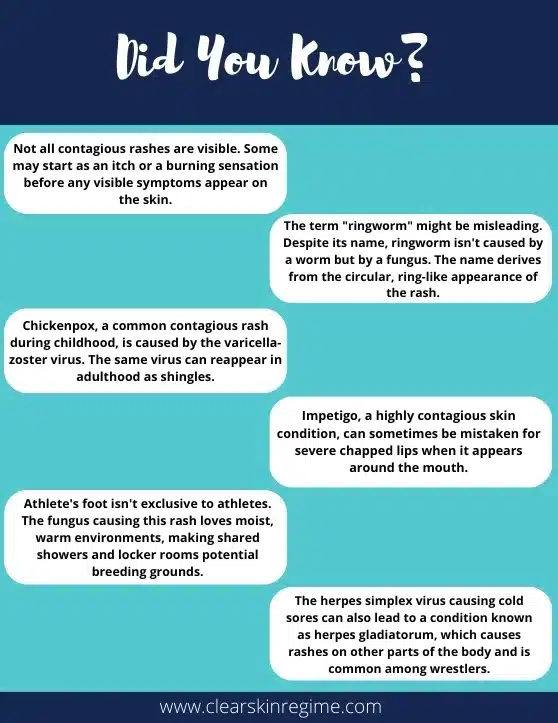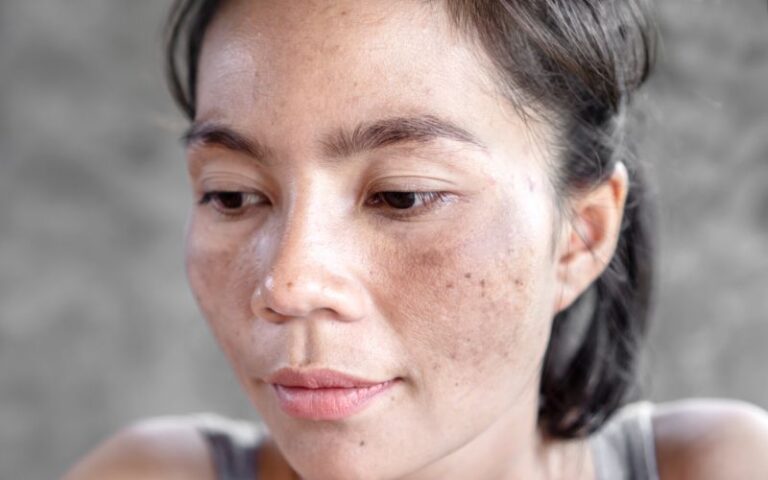Demystifying Contagious Rashes: Your Comprehensive FAQ Guide

Ever had that itching, uncomfortable sensation on your skin followed by the horror of spotting an unfamiliar rash? We’ve all been there, and immediately, the flood of questions begin. “Is it contagious? Should I avoid contact with others? How did I get it?”
Our skin encounters numerous challenges in our day-to-day lives, and rashes can be both a cause for concern and a topic shrouded in myths.
Enter our guide – Whether you’re a concerned parent, an individual suffering from an unexplained skin issue, or simply curious, this guide is tailored just for you. Let’s journey together into the world of rashes, debunking myths, answering burning questions, and bringing clarity to a topic that affects many.
Ready to scratch the surface? Let’s dive in!

Q: What is a contagious rash?
A: A contagious rash is a skin problem that can be transferred from one person to another. These rashes might be caused by bacteria, viruses, or fungal infections like athlete’s foot.
Q: Is roseola contagious?
A: Yes, roseola is contagious. It’s a common virus that affects kids, causing a fever followed by a rash. Good hygiene can help in preventing its spread.
Q: Are viral rashes contagious?
A: Absolutely! Most viral rashes, like foot-mouth disease, can spread from person to person. It’s essential to take precautions if someone around you has one.
Q: Is a shingles rash contagious?
A: Yes, the shingles rash is contagious, especially to people who haven’t had chickenpox. The rash should be covered to avoid passing it on to others.
Q: I’ve heard of perioral dermatitis. Is it contagious?
A: No need to worry! Perioral dermatitis, which appears around the mouth and face, isn’t contagious. However, it’s always a good idea to get a medical diagnosis to understand it better.
Q: What about intertrigo? Is that contagious?
A: Intertrigo, a rash appearing in skin folds, isn’t contagious on its own. But if caused by fungal infections, like jock itch, those infections can spread.
Q: Why is a medical diagnosis important for rashes?
A: A medical diagnosis helps in correctly identifying the type of rash, its causes, and the best treatment options. Some rashes, like cold sores, need specific care.
Q: Can fungal infections lead to contagious rashes?
A: Yes, some fungal infections like athlete’s foot or jock itch can be contagious and spread through contact or shared items.
Q: Are cold sores considered a contagious rash?
A: Definitely! Cold sores are painful blisters around the mouth caused by a virus. They are very contagious, so it’s best to avoid close contact when one is present.
Q: How can I prevent the spread of contagious rashes in my home?
A: Regular handwashing, avoiding sharing personal items like towels or razors, and keeping the affected area clean and covered can help reduce the spread of contagious rashes.
Q: How long does it take for a contagious rash to appear after exposure?
A: The time varies based on the cause. For example, roseola might appear within a week of exposure, while fungal infections like athlete’s foot could take longer.
Q: Are there over-the-counter treatments for these rashes?
A: Yes, many rashes, especially those caused by fungal infections, have over-the-counter treatments. However, it’s crucial to get a medical diagnosis to ensure you’re using the right treatment.
Q: Can adults get foot-mouth disease, or is it just kids?
A: While it’s more common in kids, adults can indeed get foot-mouth disease. It’s always a good idea to practice good hygiene to prevent its spread.
Q: How do I differentiate between a viral and fungal rash?
A: While both can be itchy and uncomfortable, fungal rashes often have a more defined edge and may appear scaly. Viral rashes might accompany other symptoms like fever. A medical diagnosis is the best way to determine the type.
Q: What are some common symptoms of viral rashes?
A: Viral rashes can be varied, but common symptoms include redness, bumps or spots on the skin, itchiness, and sometimes fever or fatigue.
Q: Can I get a rash from someone else’s cold sore?
A: Yes, cold sores are caused by the herpes simplex virus and are very contagious. Direct contact with a cold sore can lead to transmission.
Q: Is it safe to go swimming if I have a contagious rash?
A: It’s best to avoid swimming if you have a contagious skin rash. Pools, especially public ones, can become a medium for transmission, putting others at risk.
Q: How can I distinguish between jock itch and other rashes in the groin area?
A: Jock itch, a fungal infection, typically presents as a red, itchy rash with a well-defined, scaly edge in the groin area. However, other conditions might look similar, so a medical diagnosis is vital to ensure correct treatment.
Q: Are there natural remedies for these contagious rashes?
A: Some natural remedies like apple cider vinegar, tea tree oil, neem leaves, turmeric, and aloe vera can help with symptoms. However, it’s important to consult with a healthcare professional before trying any home remedies.
Q: Can stress trigger contagious rashes?
A: While stress itself doesn’t cause contagious rashes, it can weaken the immune system, making one more susceptible to infections or reactivating dormant viruses like the one responsible for cold sores.
Q: Is it necessary to isolate a family member with a contagious rash?
A: While complete isolation might not be feasible, it’s crucial to minimize direct contact, especially with vulnerable individuals like babies or elderly family members. Regular handwashing and separate personal items can also help.
Q: How often should I change bedding if I or someone in my family has a contagious rash?
A: It’s a good practice to change and wash bedding every few days if someone has a contagious rash, using hot water and a thorough drying cycle.
Q: Can I get a contagious rash from a pet?
A: Yes, pets can carry certain fungi or mites that might transfer to humans. Regular vet check-ups and good pet hygiene can help prevent this.
Q: Are contagious rashes more common in certain seasons?
A: Some rashes, especially those caused by fungal infections like athlete’s foot, might be more common in warm, humid months. However, viral rashes can occur at any time of the year.
Q: Can contagious rashes spread through clothing or bed linen?
A: Yes, certain contagious rashes, especially those caused by fungal infections like athlete’s foot or jock itch, can spread through shared clothing or bed linen.
Q: How can I boost my immune system to prevent recurrent rashes?
A: Maintaining a balanced diet, regular exercise, getting adequate sleep, managing stress, and avoiding smoking or excessive alcohol can help strengthen your immune system.
Q: Are babies more susceptible to contagious rashes?
A: Babies often have sensitive skin and developing immune systems, making them more prone to various rashes, including contagious ones.
Q: Can vaccines prevent any contagious rashes?
A: Yes, certain vaccines, such as the varicella vaccine for chickenpox or the MMR vaccine for measles, can help prevent specific viral rashes.
Q: If I’ve had a contagious rash once, can I get it again?
A: It depends on the type. While some viral infections provide immunity once you’ve had them, fungal infections like athlete’s foot can recur if conditions are favorable.
Q: How do I know if my rash requires a visit to the doctor?
A: If a rash spreads quickly, accompanied by other symptoms like fever, or it’s causing significant discomfort, it’s a good idea to seek medical advice. Persistent rashes that don’t improve with over-the-counter treatments also warrant a doctor’s visit.
Q: Can makeup or skincare products trigger a rash that might be confused with a contagious one?
A: Yes, some people might have allergic reactions or sensitivities to ingredients in cosmetics or skincare products, leading to rashes. However, these rashes aren’t contagious but can resemble some contagious skin conditions.
Q: Are there any dietary changes that can help prevent recurring fungal rashes?
A: Reducing sugar and refined carbs, increasing the intake of probiotic-rich foods, and keeping a well-balanced diet can help in preventing recurrent fungal infections.
Q: Can hand sanitizers help prevent the spread of contagious rashes?
A: Hand sanitizers can kill many germs and bacteria, but they might not be effective against all types of pathogens that cause contagious rashes. Regular handwashing with soap and water is more universally effective.
Q: Are there any specific soaps or body washes that help prevent contagious rashes?
A: Antifungal and antibacterial soaps can help in certain cases, especially if you’re prone to fungal infections. However, it’s essential to ensure they don’t over-dry the skin, which can make it more vulnerable.
Q: Does frequent travel increase the risk of catching a contagious rash?
A: Travel, especially to crowded places or areas with different climates and hygiene standards, can increase the risk of exposure to pathogens causing contagious rashes.
Q: How do I differentiate between a heat rash and a contagious rash in summer?
A: Heat rash typically appears as small, itchy red bumps due to blocked sweat ducts and usually goes away as the skin cools. Contagious rashes might have varied symptoms and may persist or spread.
Q: Can sunburn lead to a rash that might be mistaken for a contagious one?
A: Sunburn can trigger the skin to become red, sore, and blistered. While it’s not contagious, it can sometimes be mistaken for certain contagious rashes due to its appearance.
Q: If someone in my household has a contagious rash, how should I disinfect shared spaces?
A: Regularly clean and disinfect common areas, especially bathrooms and kitchens. Wash bedding and clothes in hot water, and consider using disinfectant sprays or wipes on frequently touched surfaces.
Q: Is it possible for a contagious rash to be asymptomatic, meaning showing no symptoms?
A: Some infections can be asymptomatic initially or manifest very mild symptoms that go unnoticed. While the individual might not show typical rash signs, they could still be contagious.
Q: Are there specific groups of people more prone to getting contagious rashes?
A: Individuals with weakened immune systems, such as the elderly, those with chronic illnesses, or those undergoing treatments like chemotherapy, might be more susceptible to contagious rashes.





